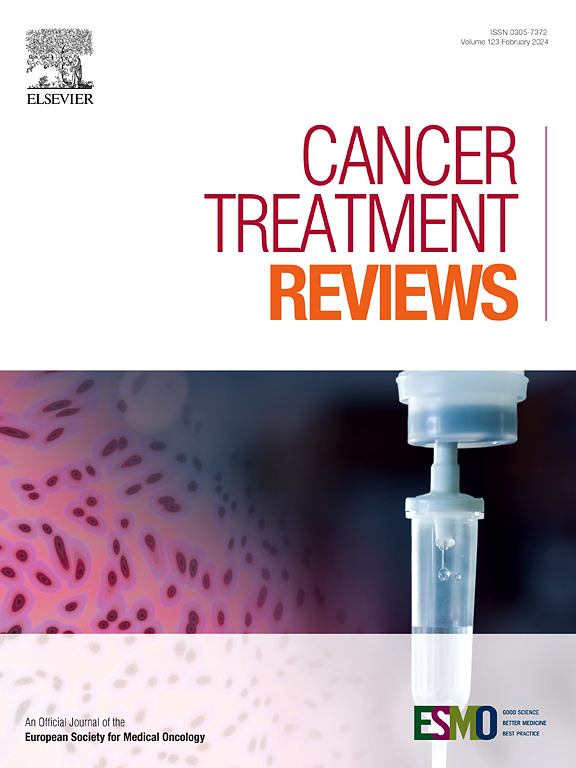Chimeric antigen receptor NK cells for breast cancer immunotherapy
IF 9.6
1区 医学
Q1 ONCOLOGY
引用次数: 0
Abstract
Breast cancer, a predominant malignancy afflicting women globally, demands innovative therapeutic strategies beyond traditional treatments such as surgery, chemotherapy, radiotherapy, and endocrine therapy. Among the emerging therapies, immunotherapy has demonstrated substantial promise, particularly employing chimeric antigen receptor (CAR) technology. This review elucidates the prospect of CAR-modified natural killer (NK) cells in treating breast cancer. NK cells, vital components of the immune system, possess the capability to non-specifically target and extinguish neoplastic cells. Through genetic engineering, CAR constructs targeting specific breast cancer antigens, including HER2, EGFR, PD-L1, MSLN, and Trop2, are integrated into NK cells, thereby enhancing their tumor recognition and cytotoxicity. The review delves into the structural optimization of CAR-NK cells, discussing design elements such as scFv, hinge regions, and activation signals, and emphasizes strategies to augment CAR-NK cell functionality and persistence within the tumor microenvironment. Combining CAR-NK cells with other therapeutic modalities (such as chemotherapy and checkpoint inhibitors) is explored to enhance therapeutic efficacy. Preclinical researches emphasized the efficacy of CAR-NK cells in targeting breast cancer cells, paving the way for future clinical applications and offering hope for improved outcomes in breast cancer patients.
嵌合抗原受体NK细胞用于乳腺癌免疫治疗
乳腺癌是困扰全球妇女的主要恶性肿瘤,需要创新的治疗策略,而不是传统的治疗方法,如手术、化疗、放疗和内分泌治疗。在新兴疗法中,免疫疗法已经显示出巨大的前景,特别是使用嵌合抗原受体(CAR)技术。本文综述了car修饰的自然杀伤细胞(NK)治疗乳腺癌的前景。NK细胞是免疫系统的重要组成部分,具有非特异性靶向和消灭肿瘤细胞的能力。通过基因工程,将靶向乳腺癌特异性抗原HER2、EGFR、PD-L1、MSLN和Trop2的CAR构建物整合到NK细胞中,从而增强NK细胞的肿瘤识别能力和细胞毒性。这篇综述深入研究了CAR-NK细胞的结构优化,讨论了scFv、铰链区域和激活信号等设计元素,并强调了增强CAR-NK细胞功能和肿瘤微环境内持久性的策略。将CAR-NK细胞与其他治疗方式(如化疗和检查点抑制剂)联合使用以提高治疗效果。临床前研究强调了CAR-NK细胞靶向乳腺癌细胞的功效,为未来的临床应用铺平了道路,为改善乳腺癌患者的预后带来了希望。
本文章由计算机程序翻译,如有差异,请以英文原文为准。
求助全文
约1分钟内获得全文
求助全文
来源期刊

Cancer treatment reviews
医学-肿瘤学
CiteScore
21.40
自引率
0.80%
发文量
109
审稿时长
13 days
期刊介绍:
Cancer Treatment Reviews
Journal Overview:
International journal focused on developments in cancer treatment research
Publishes state-of-the-art, authoritative reviews to keep clinicians and researchers informed
Regular Sections in Each Issue:
Comments on Controversy
Tumor Reviews
Anti-tumor Treatments
New Drugs
Complications of Treatment
General and Supportive Care
Laboratory/Clinic Interface
Submission and Editorial System:
Online submission and editorial system for Cancer Treatment Reviews
 求助内容:
求助内容: 应助结果提醒方式:
应助结果提醒方式:


